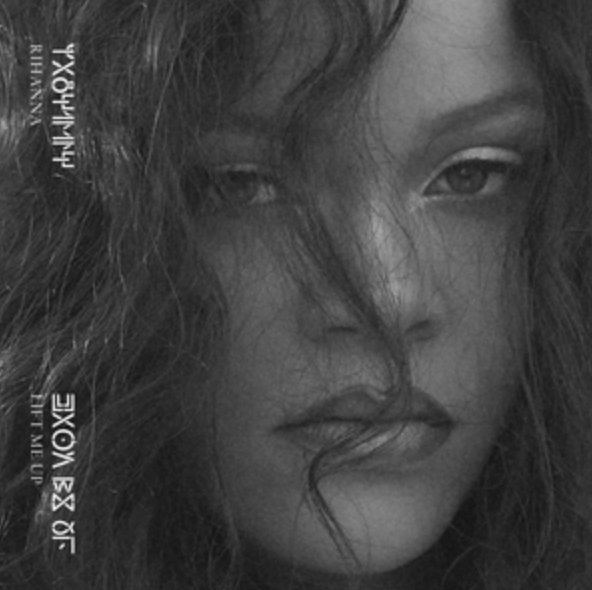Gradually getting the masses accustomed to her presence among us as a musician again (as opposed to just another beauty and fashion mogul), Rihanna has decided to “reintroduce” herself as only Rihanna could: by releasing a song for the Black Panther: Wakanda Forever Soundtrack. It feels like a pointed initiation of her upcoming appearance at the Super Bowl Halftime Show. Arguably the most pressure-filled venue (and, for Ri, the most hypocritical one) a person could choose for a comeback. But it seems Rihanna also wants to remind people of her prowess not just as a performer, but as a vocalist before taking that stage. Thus, she’s given her listeners “Lift Me Up,” co-written by Ludwig Göransson, Ryan Coogler (who also directed both Black Panther movies) and Tems.
The song was penned as a tribute with Chadwick Boseman in mind, a fact that becomes quickly apparent a few verses in. So, of course, it could be nothing other than a ballad, even though many were likely hoping for Rihanna’s first comeback single to be one of her proverbial “bangers.” And yes, considering how “familiar” “Lift Me Up” sounds, it’s fitting that Ri’s last solo effort to chart was the belted-out ballad, “Love on the Brain.” Released as the final single from 2016’s Anti, it showcased Rihanna’s vocals at their rawest and most intense. Just as so many of her other indelible ballads have—including “Stay” (from Unapologetic), “We All Want Love” (from Talk That Talk), “California King Bed” (from Loud), “Cold Case Love” (from Rated R), “Cry” (from Good Girl Gone Bad), “Unfaithful” (from A Girl Like Me) and “The Last Time” (from Music of the Sun).
Building on her long history of nailing this particular style of song while making it all her own (hear also: “Higher”), the single’s album artwork perhaps deliberately harkens back to Ri’s earlier albums, Music of the Sun and A Girl Like Me, in that it’s a close-up shot of her face. Unlike the expressions in the aforementioned albums, however, there is an undeniable tone of somberness to this one, confirmed by the image being in black-and-white. And this is the first instance of one of her ballads being an “homage” track rather than a pining number that addresses love lost or otherwise tainted.
Because of Boseman’s role as King T’Challa, his influence on Black culture markedly escalated at the time of Black Panther’s release in 2018. Just two years later, he would die of colon cancer at the age of forty-three (adding to the general sentiment of, “Damn, this is a really shitty year for Black people” that occurred in 2020). In the span of his seventeen-year career (which began with a recurring role on All My Children), Boseman became an almost god-like figure when he stepped into the part of Black Panther, first appearing as King T’Challa in Captain America: Civil War, which, incidentally, came out the same year as Anti. The fact that Wakanda Forever pays so much of an homage to him with a song like this is yet another testament to what Boseman playing this part meant (and still means) to a great many people. And Rihanna does plenty of justice to the fallen king with her moving lyrics and delivery. Bittersweetly urging, “Burning in a hopeless dream/Hold me when you go to sleep/Keep me in the warmth of your love/When you depart, keep me safe/Safe and sound.” The subjects of Wakanda are surely asking the same of their erstwhile king.
In the second verse, Rihanna contrasts the previous imagery of “burning” with, “Drowning in an endless sea/Take some time and stay with me.” There’s that word she so loves to use in a ballad: “stay.” And yes, parting is such unwanted sorrow. With many who do it, like Boseman, not actually desiring to. The rest of the song’s lyrical composition is fairly simple, but then, that’s the point. For, to reiterate what so many have said in a varying form before her, including The Beatles and Madonna, simplicity is key. Which is why Rihanna insists straightforwardly, “We need light/We need love.” Delivered with a powerful earnestness, the song is even one to rival what Beyoncé did with “Be Alive” for the King Richard Soundtrack.
“Born Again” (which sounds like it could be the sequel to Lana Del Rey’s “Born to Die”), a pertinent title for Rihanna’s own imminent rebirth as a recording artist, will also be released from the soundtrack to further lay the groundwork for the singer-turned-entrepreneur’s musical return. And while most wouldn’t be able to live up to the pressure surrounding such a long hiatus, it seems the break has only sharpened Rihanna’s skills and refreshed her vigor for “the craft.” Given her time to pause and reflect… which should prove to the “Powers That Be” that “allowing” people time to recuperate from overworking isn’t a bane to capitalism, especially not in Rihanna’s case.





















[…] Genna Rivieccio Source link […]